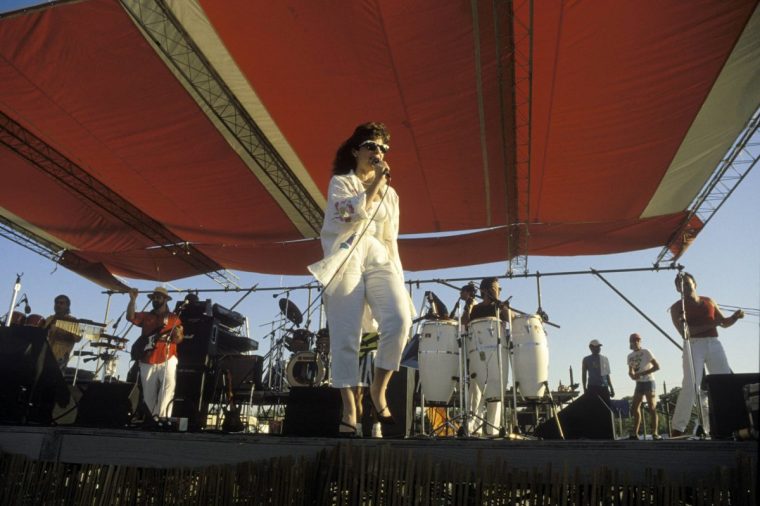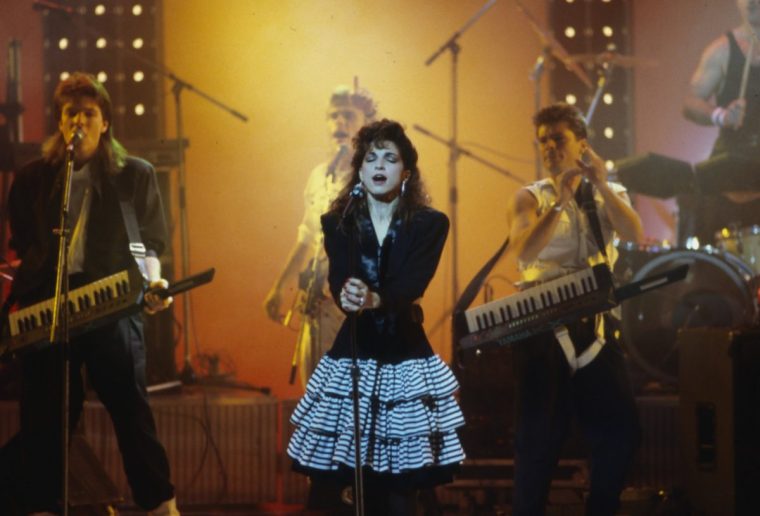This is a year of milestone anniversaries for Gloria Estefan: it’s been 50 years since the queen of Latin pop began her journey into music, 40 since her megahit “Conga” propelled her and her former band, the Miami Sound Machine, on to the international stage, and 35 since the bus crash that almost left her paralysed and threatened to derail her career just as it was as its peak.
Along the way she has sold more than 100 million records, toured the world multiple times, forged a new career as an actor, and established a chain of hotels and restaurants she runs with husband and producer Emilio. A stage musical, Basura, which she’s currently co-writing with her daughter Emily, and her new Spanish-language album, Raíces, adds up to one very hectic schedule.
“I’ve never been busier, but it’s things that I’ve chosen,” Estefan, 67, tells me, on a break from workshopping her musical in New York. “Before, when I would release an album, you were forced to go and promote it. Now, because of the way things work, I can put a story on my Instagram and it will get picked up all over. So it’s not two months of continuous interviews and promotions. Now I can just choose to do what I want to do, and sometimes it all piles up – like right now.”
Music, of course, continues to be key to her output, and her latest offering is Raíces (which means roots in English), a Spanish-language album, her first in 18 years. She describes as a “modern-day Mi Tierra“, her 1993 Grammy-award-winning record that celebrated the rhythms of her homeland Cuba in the 1930s and 1940s. It was a hit in non-Spanish language countries – a vindication for Estefan, who knew it had to be released at the “peak” of her popularity for audiences to embrace it.

Raíces is “all about the sound of the moment” – a celebration of the rhythms that have shaped her own career. There are 13 tracks, including two in English – one of which is dedicated to her grandson, Sasha.
The album was the brainchild of her producer husband Emilio, but Estefan was initially unsure she would have time to make it. Then Emilio played her the album’s title track and lead single, which he had written and insisted couldn’t be sung by anyone else. Little by little, he brought her more songs and an album was formed. “By the time I got to the studio I knew all the songs, which isn’t usual,” Estefan says. “It was a very freeing experience.”
The lead single has been a number one hit on Billboard’s Latin, Tropical and Latin Pop airplay charts. It coincides with a resurgence of interest in her 1985 anthem “Conga” – an infectious fusion of pop and latin beats that invites its listeners to get up and dance – after it was inducted into the Grammy Hall of Fame earlier this year.
“I guess the 40th anniversary of that song has made people curious to listen again,” she says. “It still gets played everywhere I go.” While she isn’t protective of it when it comes to other creatives making it their own, she has prevented it from being used in “a million schlocky commercials”.
“I don’t have a problem with humour, but sometimes you have to say no to certain things. I’ve been very careful.”

“Conga” was one of Estefan’s earliest English-language hits and opened the doors for other Latin artists, including Shakira, Ricky Martin, and Jennifer Lopez. Estefan – considered the original Latin crossover artist – went on to bring her inimitable style to a raft of hits, with catchy songs such as “Rhythm Is Gonna Get You” (added to the Library of Congress’ National Recording Registry because of its cultural importance), “1-2-3” and “Get on Your Feet”, alongside heart-wrenching ballads, including “Anything for You” and “Don’t Wanna Lose You”.
But Estefan never meant to be a musician. She was studying to be a psychologist when she first joined Emilio’s band – then the Miami Latin Boys, later Miami Sound Machine – aged 17 for a bit of fun. “It was never intended to be my career,” she says. “It was my opportunity to just let off steam, you know. It was the biggest blast, going to all these parties and singing. Music has always been exciting to me and Emilio. And that’s just how we’ve kept living our lives throughout this whole thing.”
However, in 1990, it almost all came to an end. Estefan, Emilio and their son Nayib were involved in a bus crash while on tour. Estefan broke her back and had to undergo major spinal surgery. Doctors warned her she may never walk again.
Less than a year later, however, she was back on stage, at the American Music Awards. “It’s funny – people are sometimes reticent about bringing the accident up,” she says. “But it is not a negative experience. Was it difficult? Absolutely. Was it scary as hell? Yes. But would I change it? I wouldn’t want to go through it again, but I would not change it as it gave me a much richer way to enjoy every experience I have had since then.”
One of those experiences was giving birth to her “miracle” daughter, Emily, in 1994 – after thinking she would never have children again. Emily is now 30 and appeared with Estefan on the Facebook series Red Table Talk, where – together with Estefan’s niece, Lili Estefan – they had honest and open chats about topics such as coming out (Emily came out as gay to her parents in 2017), divorce, and abuse.

Estefan chose the series to share her own story of abuse, revealing she was molested when she was a child aged nine by a “respected musician” known to her family. She hadn’t spoken of it publicly before then, because her mother (who died in 2017) would not have been able to handle it.
“The only reason I didn’t speak of it before, despite the MeToo movement and everything that was happening, was because my mum was still alive,” she explains. “Any time I would bring up any questions I never got to ask as a kid, she would just completely break down and couldn’t handle it.”
She laughs. “My mum would get nervous just at the mention of the word ‘sex’. She was going to be a nun. She hadn’t even kissed my dad before they got married. She came from a very repressed time in Cuba where there were just two types of women: your wife, and the women who enjoyed sex.”
But Estefan knew she would share her story one day. “I wanted to share it, because I wanted people to realise that, yes, stuff happens, but you can move on and put it behind you and have a wonderful, fulfilling life,” she says.
Estefan certainly has had that. She’s been happily married to Emilio since 1978 and has enjoyed a decades-long career. She is concerned about the America that exists now, as opposed to the one that welcomed her aged two, when she and her family fled Cuba under Castro to start a new life in Miami, which has been home ever since.
“We see people getting carted away in this country that is supposed to be the bastion of freedom,” she says. “But I also think we have to be careful not to assume the people here are all like that, as that’s not the case at all. The people in this country are varied and diversified.”
In particular, she worries for the arts world, especially as Donald Trump has begun to dismantle the nation’s cultural institutions. “It scares me,” she says. “And I think a lot of it is done for the ‘perception’ of action being taken. But in this country, [a president] lasts four years, and hopefully not too much damage that is irreversible will be done. And it could be reversed just as quickly.”
“It scares me,” she adds, “when I see someone ignore a judicial law or a judicial ruling, as this country is based on a separation of power. But I would rather focus on continuing to put positive things into the universe, through music and art, because we need that balance. And I’m going to focus on life and love and inclusion. We need to put that energy out there.”
Gloria Estefan’s new album, Raíces, is out now
